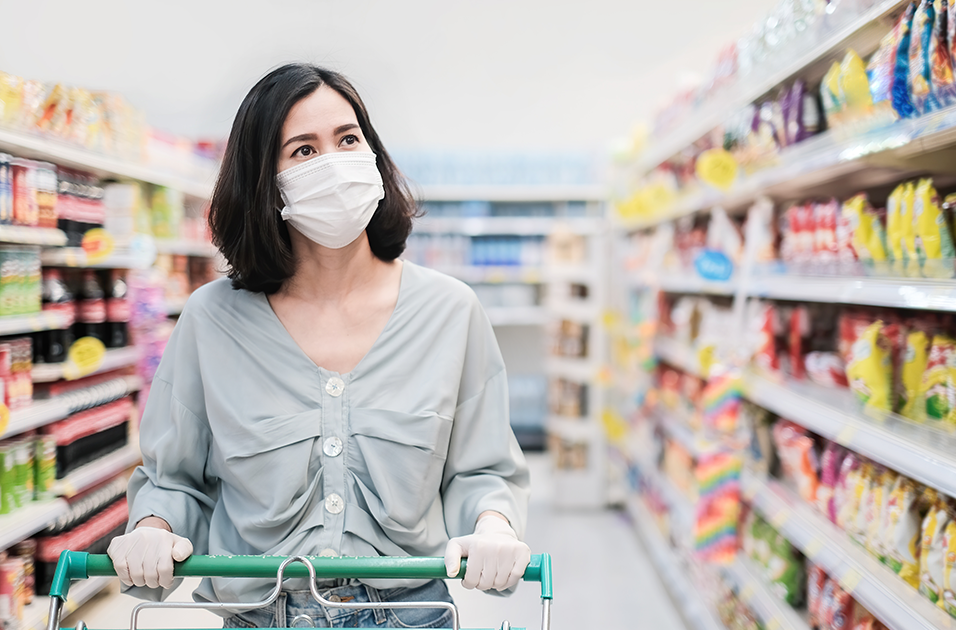What to know about face masks & your dental health

Masks have been shown to effectively slow the spread of COVID-19. However, what impact, if any, does it have on your dental health? There may be some indirect effects on your teeth and gums, but fortunately, they can be mitigated with a few simple solutions.
Masks have been shown to effectively slow the spread of COVID-19.1 However, what impact, if any, does it have on your dental health? There may be some indirect effects on your teeth and gums, but fortunately, they can be mitigated with a few simple solutions.
How masks can impact your mouth
While it may make you more aware of bad breath and the need to brush and floss better, a mask on its own does not cause any known dental issues. However, wearing one may change your behavior, which can potentially lead to problems. People may breathe through their mouths2 or fail to drink enough water3 when they wear a mask, which can cause dry mouth — also called xerostomia. A recent study found 35% of healthcare workers experienced dry mouth after prolonged mask-wearing.4
Dry mouth may result in issues such as sore throat and hoarseness, but it can also lead to cavities and gum disease over time.5 Your teeth and gums need saliva to help counteract harmful bacteria from plaque. Saliva washes away food particles and counteracts acids that harmful, cavity-causing bacteria like to feed on. When your mouth has less saliva due to mouth breathing, it can leave you more susceptible to tooth decay and gum disease.6

To be clear, this is not a reason to stop wearing a mask. Masks on their own do not cause dry mouth. Failing to stay hydrated and breathing through your mouth can cause dryness even without a mask.5 However, making a few behavioral changes while wearing a mask can help you prevent dry mouth.
What can you do to combat dry mouth?
When you’re wearing a mask, make a conscious effort to breathe through your nose. Not only does it keep your mouth from drying out, but it also allows your body to better absorb oxygen and helps protect the immune system from infection. If you’re congested and unable to breathe through your nose, consider taking an over-the-counter decongestant or consult your doctor for appropriate treatment.5
You should also drink plenty of water throughout the day — the amount you need varies based on many factors, including your sex, level of exercise, and the temperature and climate in your area.7 If you have to wear a mask throughout the day while you work, make a goal to take regular breaks in a socially distanced area where you can remove your mask safely and drink water.

Staying hydrated can also prevent bad breath by washing away food particles and encouraging saliva production, which neutralizes the bacteria that cause foul odors. If you continue to notice bad breath while wearing a mask, it may be time to evaluate your dental hygiene regimen. The American Dental Association encourages brushing your teeth twice and flossing once per day. If bad breath persists, make an appointment with your dentist to get to the bottom of what’s causing it.8
References
1 https://www.cdc.gov/coronavirus/2019-ncov/more/masking-science-sars-cov2.html
2 https://www.childrensmn.org/2020/07/15/breathing-tips-while-wearing-mask/
3 https://blogs.cdc.gov/niosh-science-blog/2020/06/10/ppe-burden/
4 https://www.ncbi.nlm.nih.gov/pmc/articles/PMC7490318/
5 https://www.healthline.com/health/mouth-breathing
≃ For informational purposes only and not intended to be relied on as complete information, or to be construed as tax, legal, investment or medical advice. This is not a sale of or an offer to purchase a benefits plan from Beam. For more information about your benefits plan contact support@beambenefits.com
